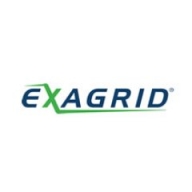

ExaGrid EX Series and NetApp Cloud Backup are competing solutions in data protection and storage. ExaGrid EX Series is noted for its cost-effectiveness and customer support, while NetApp Cloud Backup stands out with advanced features and cloud integration.
Features: ExaGrid EX Series provides superior scalability, efficient data deduplication, and rapid data recovery. NetApp Cloud Backup is known for seamless integration with cloud environments, multi-cloud capability, and flexible data management options.
Ease of Deployment and Customer Service: ExaGrid EX Series simplifies initial setup with an appliance-based deployment and proactive customer support. NetApp Cloud Backup offers a cloud-native deployment model, benefiting from ongoing software updates and global support infrastructure.
Pricing and ROI: ExaGrid EX Series is often noted for lower upfront costs and favorable ROI in large-scale data storage environments. NetApp Cloud Backup may have a higher initial investment but offers long-term ROI through comprehensive cloud integration and flexibility.
| Product | Market Share (%) |
|---|---|
| ExaGrid EX Series | 6.4% |
| NetApp Cloud Backup | 1.6% |
| Other | 92.0% |
| Company Size | Count |
|---|---|
| Small Business | 5 |
| Midsize Enterprise | 2 |
NetApp Cloud Backup is a fully integrated service for cloud backup and restoration. It was created to comply fully with NetApp's native data management software ONTAP, used for hybrid cloud experience. NetApp Cloud Backup is used to create backup and restoration for the protection and archiving of data, databases, and virtual machines related to the Cloud and On-Premises data in ONTAP. The way NetApp Cloud Backup works is by automatically creating block-level incremental backups. This ensures that the created backups are very fast and easy to restore. It is suitable for data protection regarding on-premises software as well as in the public cloud. NetApp Cloud Backup provides users with the ability to protect their cloud data at affordable prices and with a user-friendly interface so they don't need a lot of technical knowledge to be able to secure their cloud storage.
The copies created by NetApp Cloud Backup can be stored in the user's personal object storage in the cloud as well as on premises with StorageGRID - NetApp's storage platform. The backup copies can be restored to the original source or to a different source in Cloud Volumes ONTAP. NetApp Cloud Backup provides backups to AWS, Azure, and Google Cloud.
The features NetApp Cloud Backup provides include:
In addition to enhanced security and protection from malicious attacks, the advantages of using NetApp Cloud Backup include:
Abbasi P., a User at a financial services firm, likes that NetApp Cloud Backup is a completely agentless solution.
A Service Manager at a tech services company values its stability, scalability, and good technical support.
We monitor all Deduplication Software reviews to prevent fraudulent reviews and keep review quality high. We do not post reviews by company employees or direct competitors. We validate each review for authenticity via cross-reference with LinkedIn, and personal follow-up with the reviewer when necessary.